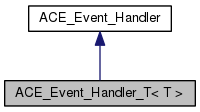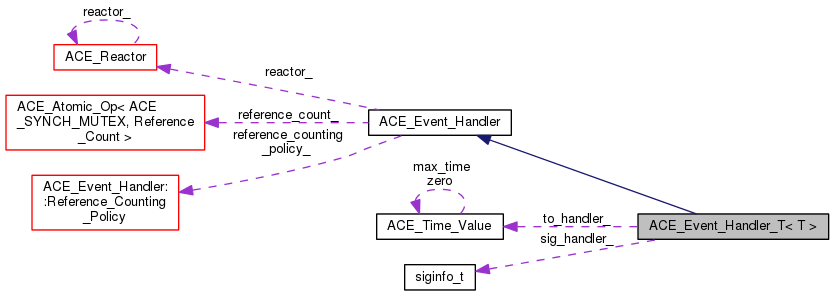|
ACE
6.1.3
|
|
ACE
6.1.3
|
Enable a class that doesn't inherit from the ACE_Event_Handler to be incorporated into the ACE_Reactor framework. Thanks to Greg Lavender (g.lavender@isode.com) for sharing this idea. More...
#include <Event_Handler_T.h>


Public Types | |
| typedef ACE_HANDLE(T::* | GET_HANDLE )(void) const |
| typedef void(T::* | SET_HANDLE )(ACE_HANDLE) |
| typedef int(T::* | IO_HANDLER )(ACE_HANDLE) |
| Handle I/O events. | |
| typedef int(T::* | TO_HANDLER )(const ACE_Time_Value &, const void *) |
| Handle timeout events. | |
| typedef int(T::* | CL_HANDLER )(ACE_HANDLE, ACE_Reactor_Mask) |
| Handle close events. | |
| typedef int(T::* | SIG_HANDLER )(int, siginfo_t *, ucontext_t *) |
| = Initialization and termination methods. | |
 Public Types inherited from ACE_Event_Handler Public Types inherited from ACE_Event_Handler | |
| enum | { LO_PRIORITY = 0, HI_PRIORITY = 10, NULL_MASK = 0, READ_MASK = (1 << 0), WRITE_MASK = (1 << 1), EXCEPT_MASK = (1 << 2), ACCEPT_MASK = (1 << 3), CONNECT_MASK = (1 << 4), TIMER_MASK = (1 << 5), QOS_MASK = (1 << 6), GROUP_QOS_MASK = (1 << 7), SIGNAL_MASK = (1 << 8), ALL_EVENTS_MASK, RWE_MASK, DONT_CALL = (1 << 9) } |
| enum | { ACE_EVENT_HANDLER_NOT_RESUMED = -1, ACE_REACTOR_RESUMES_HANDLER = 0, ACE_APPLICATION_RESUMES_HANDLER } |
| typedef long | Reference_Count |
| Reference count type. | |
Public Member Functions | |
| ACE_Event_Handler_T (T *op_handler, int delete_handler, GET_HANDLE get_handle=0, IO_HANDLER input=0, CL_HANDLER close=0, SIG_HANDLER sig=0, TO_HANDLER timeout=0, IO_HANDLER output=0, SET_HANDLE set_handle=0, IO_HANDLER except=0) | |
| Initialize the op_handler. | |
| ~ACE_Event_Handler_T (void) | |
| Close down and delete the <op_handler> | |
| virtual ACE_HANDLE | get_handle (void) const |
| Get the I/O handle. | |
| virtual void | set_handle (ACE_HANDLE) |
| Set the I/O handle. | |
| virtual int | handle_input (ACE_HANDLE fd=ACE_INVALID_HANDLE) |
| Called when input events occur (e.g., connection or data). | |
| virtual int | handle_output (ACE_HANDLE fd=ACE_INVALID_HANDLE) |
| virtual int | handle_exception (ACE_HANDLE fd=ACE_INVALID_HANDLE) |
| Called when an exceptional events occur (e.g., SIGURG). | |
| virtual int | handle_timeout (const ACE_Time_Value &tv, const void *arg=0) |
| virtual int | handle_close (ACE_HANDLE fd, ACE_Reactor_Mask close_mask) |
| virtual int | handle_signal (int signum, siginfo_t *=0, ucontext_t *=0) |
| T * | op_handler (void) |
| void | op_handler (T *) |
| GET_HANDLE | handle_get (void) |
| void | handle_get (GET_HANDLE) |
| SET_HANDLE | handle_set (void) |
| void | handle_set (SET_HANDLE) |
| IO_HANDLER | input_handler (void) |
| void | input_handler (IO_HANDLER) |
| IO_HANDLER | output_handler (void) |
| void | output_handler (IO_HANDLER) |
| IO_HANDLER | except_handler (void) |
| void | except_handler (IO_HANDLER) |
| TO_HANDLER | to_handler (void) |
| void | to_handler (TO_HANDLER) |
| CL_HANDLER | cl_handler (void) |
| void | cl_handler (CL_HANDLER) |
| SIG_HANDLER | sig_handler (void) |
| void | sig_handler (SIG_HANDLER) |
| void | dump (void) const |
| Dump the state of an object. | |
 Public Member Functions inherited from ACE_Event_Handler Public Member Functions inherited from ACE_Event_Handler | |
| virtual | ~ACE_Event_Handler (void) |
| Destructor is virtual to enable proper cleanup. | |
| virtual int | priority (void) const |
| virtual void | priority (int priority) |
| Set the priority of the Event_Handler. | |
| virtual int | handle_exit (ACE_Process *) |
| Called when a process exits. | |
| virtual int | resume_handler (void) |
| virtual int | handle_qos (ACE_HANDLE=ACE_INVALID_HANDLE) |
| virtual int | handle_group_qos (ACE_HANDLE=ACE_INVALID_HANDLE) |
| virtual void | reactor (ACE_Reactor *reactor) |
| Set the event demultiplexors. | |
| virtual ACE_Reactor * | reactor (void) const |
| Get the event demultiplexors. | |
| virtual ACE_Reactor_Timer_Interface * | reactor_timer_interface (void) const |
| Get only the reactor's timer related interface. | |
| virtual Reference_Count | add_reference (void) |
| Increment reference count on the handler. | |
| virtual Reference_Count | remove_reference (void) |
| Decrement reference count on the handler. | |
| Reference_Counting_Policy & | reference_counting_policy (void) |
| Current Reference_Counting_Policy. | |
Public Attributes | |
| ACE_ALLOC_HOOK_DECLARE | |
| Declare the dynamic allocation hooks. | |
Protected Attributes | |
| T * | op_handler_ |
| Pointer to the object that handles all the delegated operations. | |
| IO_HANDLER | input_handler_ |
| IO_HANDLER | output_handler_ |
| IO_HANDLER | except_handler_ |
| TO_HANDLER | to_handler_ |
| Handle timeout events. | |
| CL_HANDLER | cl_handler_ |
| Handle close events. | |
| SIG_HANDLER | sig_handler_ |
| Handle signal events. | |
| int | delete_handler_ |
| SET_HANDLE | set_handle_ |
| GET_HANDLE | get_handle_ |
 Protected Attributes inherited from ACE_Event_Handler Protected Attributes inherited from ACE_Event_Handler | |
| Atomic_Reference_Count | reference_count_ |
| Reference count. | |
Additional Inherited Members | |
 Static Public Member Functions inherited from ACE_Event_Handler Static Public Member Functions inherited from ACE_Event_Handler | |
| static ACE_THR_FUNC_RETURN | read_adapter (void *event_handler) |
| static int | register_stdin_handler (ACE_Event_Handler *eh, ACE_Reactor *reactor, ACE_Thread_Manager *thr_mgr, int flags=THR_DETACHED) |
| static int | remove_stdin_handler (ACE_Reactor *reactor, ACE_Thread_Manager *thr_mgr) |
| Performs the inverse of the register_stdin_handler() method. | |
 Protected Types inherited from ACE_Event_Handler Protected Types inherited from ACE_Event_Handler | |
| typedef ACE_Atomic_Op < ACE_SYNCH_MUTEX, Reference_Count > | Atomic_Reference_Count |
| Typedef for implementation of reference counting. | |
 Protected Member Functions inherited from ACE_Event_Handler Protected Member Functions inherited from ACE_Event_Handler | |
| ACE_Event_Handler (ACE_Reactor *=0, int priority=ACE_Event_Handler::LO_PRIORITY) | |
| Force ACE_Event_Handler to be an abstract base class. | |
Enable a class that doesn't inherit from the ACE_Event_Handler to be incorporated into the ACE_Reactor framework. Thanks to Greg Lavender (g.lavender@isode.com) for sharing this idea.
It is sometimes the case that an application has a hierarchy of operation dispatcher classes that have their own inheritance hierarchy but also would like to integrate with the ACE_Reactor. Rather than adopt a "mixin" approach, it is often cleaner to define a template as a subclass of ACE_Event_Handler and parameterize it with an operation dispatcher type. When constructing an instantiation of the ACE_Event_Handler_T object, a set of pointers to member functions must be provided so that when one of the handle_* methods is called by the ACE_Reactor, the appropriate method is called on the underlying operations object. This is done since in some cases it is useful to map any event that happens to the same method on an object. The ACE_Event_Handler_T template is instantiated by an operations object and registered with the ACE_Reactor, and it then calls the appropriate op_handler. So, it's basically just another level of indirection in event dispatching. The coupling betweent the ultimate handler of the event and the ACE_Event_Handler class is relaxed a bit by have this intermediate <op_handler_> object of type <T> around. The client object can then dynamically change the bindings for the various handlers so that during the life of one of the operation objects, it can change how it wants events to be handled. It just instantiates a new instance of the template with different bindings and reregisters this new object with the ACE_Reactor.
| typedef int(T::* ACE_Event_Handler_T< T >::CL_HANDLER)(ACE_HANDLE, ACE_Reactor_Mask) |
Handle close events.
| typedef ACE_HANDLE(T::* ACE_Event_Handler_T< T >::GET_HANDLE)(void) const |
| typedef int(T::* ACE_Event_Handler_T< T >::IO_HANDLER)(ACE_HANDLE) |
Handle I/O events.
| typedef void(T::* ACE_Event_Handler_T< T >::SET_HANDLE)(ACE_HANDLE) |
| typedef int(T::* ACE_Event_Handler_T< T >::SIG_HANDLER)(int, siginfo_t *, ucontext_t *) |
= Initialization and termination methods.
| typedef int(T::* ACE_Event_Handler_T< T >::TO_HANDLER)(const ACE_Time_Value &, const void *) |
Handle timeout events.
| ACE_Event_Handler_T< T >::ACE_Event_Handler_T | ( | T * | op_handler, |
| int | delete_handler, | ||
| GET_HANDLE | get_handle = 0, |
||
| IO_HANDLER | input = 0, |
||
| CL_HANDLER | close = 0, |
||
| SIG_HANDLER | sig = 0, |
||
| TO_HANDLER | timeout = 0, |
||
| IO_HANDLER | output = 0, |
||
| SET_HANDLE | set_handle = 0, |
||
| IO_HANDLER | except = 0 |
||
| ) |
Initialize the op_handler.
| ACE_Event_Handler_T< T >::~ACE_Event_Handler_T | ( | void | ) |
Close down and delete the <op_handler>
|
inline |
| void ACE_Event_Handler_T< T >::cl_handler | ( | CL_HANDLER | ) |
| void ACE_Event_Handler_T< T >::dump | ( | void | ) | const |
Dump the state of an object.
|
inline |
| void ACE_Event_Handler_T< T >::except_handler | ( | IO_HANDLER | ) |
|
virtual |
Get the I/O handle.
Reimplemented from ACE_Event_Handler.
|
virtual |
Called when a handle_*() method returns -1 or when the remove_handler() method is called on an ACE_Reactor. The close_mask indicates which event has triggered the handle_close() method callback on a particular handle.
Reimplemented from ACE_Event_Handler.
|
virtual |
Called when an exceptional events occur (e.g., SIGURG).
Reimplemented from ACE_Event_Handler.
|
inline |
| void ACE_Event_Handler_T< T >::handle_get | ( | GET_HANDLE | ) |
|
virtual |
Called when input events occur (e.g., connection or data).
Reimplemented from ACE_Event_Handler.
|
virtual |
Called when output events are possible (e.g., when flow control abates or non-blocking connection completes).
Reimplemented from ACE_Event_Handler.
|
inline |
| void ACE_Event_Handler_T< T >::handle_set | ( | SET_HANDLE | ) |
|
virtual |
Called when object is signaled by OS (either via UNIX signals or when a Win32 object becomes signaled).
Reimplemented from ACE_Event_Handler.
|
virtual |
Called when timer expires. current_time represents the current time that the Event_Handler was selected for timeout dispatching and act is the asynchronous completion token that was passed in when <schedule_timer> was invoked.
Reimplemented from ACE_Event_Handler.
|
inline |
| void ACE_Event_Handler_T< T >::input_handler | ( | IO_HANDLER | ) |
|
inline |
|
inline |
|
inline |
| void ACE_Event_Handler_T< T >::output_handler | ( | IO_HANDLER | ) |
|
virtual |
Set the I/O handle.
Reimplemented from ACE_Event_Handler.
|
inline |
| void ACE_Event_Handler_T< T >::sig_handler | ( | SIG_HANDLER | ) |
|
inline |
| void ACE_Event_Handler_T< T >::to_handler | ( | TO_HANDLER | ) |
| ACE_Event_Handler_T< T >::ACE_ALLOC_HOOK_DECLARE |
Declare the dynamic allocation hooks.
|
protected |
Handle close events.
|
protected |
Keeps track of whether we need to delete the handler in the destructor.
|
protected |
|
protected |
|
protected |
|
protected |
Pointer to the object that handles all the delegated operations.
|
protected |
|
protected |
|
protected |
Handle signal events.
|
protected |
Handle timeout events.
 1.8.1.2
1.8.1.2